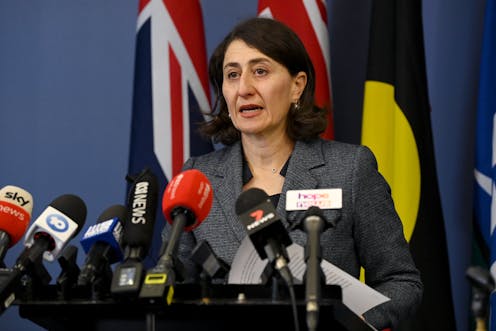ICAC is not a curse, and probity in government matters. The Australian media would do well to remember that
- Written by Denis Muller, Senior Research Fellow, Centre for Advancing Journalism, The University of Melbourne

Journalists are adept at creating and reflecting public sentiment. It is a reciprocating process: journalistic portrayal creates the sentiment, then the sentiment feeds back into journalistic portrayal.
This phenomenon can be seen clearly in the way the resignation of New South Wales Premier Gladys Berejiklian has been reported and commented on.
The problem is that public sentiment does not always remain tethered to the underlying facts, so journalism that continues to reflect that sentiment likewise tends to become unmoored.
The sentiment about Berejiklian is based on a narrative about a good woman and excellent state premier led astray by a rogue boyfriend who abused his relationship with her to advance his interests in ways that led to his being investigated for corruption. In the process, he dragged her down with him.
In essence, it is a tale we are familiar with, may even have experienced at close hand: a good person making decisions of the heart until confronted by an ugly reality. Beats there a heart so cold that cannot sympathise with this predicament?
Much of the coverage of Berejiklian’s resignation has drawn on and fed into this narrative.
It had worked for her previously when she first appeared before ICAC in October 2020, so she no doubt thought it would work again. To a large extent, she has been proved right.
Read more: Berejiklian's downfall derailed a career built on accountability and control. Now, who will replace her?[1]
In this telling[2], the NSW Independent Commission Against Corruption deliberately brought down this paragon at the height of her powers to the detriment of the public welfare, disrupting the government at a crucial moment in the pandemic.
In this telling, too, ICAC becomes the wrongdoer. Instead of stalling its investigation until heaven knows when – the pandemic is over, the federal election is done – it irresponsibly pushes on regardless.
The surprising thing is that this line of chat has been accepted uncritically by so many elements of the media.
Their understanding is not improved by coverage like this.
The facts are that ICAC is investigating the suspected corrupt allocation of about $35.5 million in taxpayers’ money: $30 million[3] to the Riverina conservatorium of music at Wagga Wagga and $5.5 million[4] to the local clay-shooting club.
ICAC is investigating whether Berejiklian, while NSW treasurer, allowed or encouraged corrupt conduct by her ex-boyfriend, the disgraced former Liberal MP for Wagga Wagga, Daryl Maguire, in respect of those allocations.
ICAC says[5] it is investigating whether, between 2012 and 2018, Berejiklian engaged in conduct that “constituted or involved a breach of public trust” by exercising public functions relating to her public role and her private personal relationship with Maguire.
It says it will begin a four-week inquiry into these questions on October 18.
It should not be presumed that ICAC will make adverse findings against Berejiklian. In similar circumstances in 1983, Neville Wran stood aside as premier during a royal commission into corruption in rugby league. He was exonerated[6] and resumed office.
So a further fact in the present case is that Berejiklian chose to resign rather than stand aside.
It is a fair bet she was unnerved by the prospect of NSW being in the hands of her National Party deputy John Barilaro for any length of time. By her resigning, the state gets a new premier from within the Liberal Party. It was a calculated choice.
ICAC is not a curse. Anyone involved in public affairs in NSW before 1988 when ICAC was established – public officials, politicians, journalists – knew that certain parts of the state administration were riven with corruption. Police, planning, prisons, even the magistracy: repeated scandals engulfed them all.
ICAC has been and remains a remarkable force for good.
A sad irony was that Nick Greiner, the Liberal premier who had the courage to establish it, became one of its early victims. In 1992 ICAC found he had misused his position to secure an independent MP’s resignation for political advantage. Greiner fell on his sword.
Read more: History repeats: how O'Farrell and Greiner fell foul of ICAC [7]
It is instructive to consider how many of the Morrison cabinet would survive exposure to an ICAC investigation.
Berejiklian’s alleged conflict of interest is not a trivial matter. It involves substantial sums of public money in an exercise that she has previously dismissed as “pork-barrelling[8]”.
This disarming term, rendered harmless by repetition, is actually about the improper distribution of public money. It is a form of vote-buying, as has been shown in the procession of rorts engaged in by the federal government over sports grants, community security grants and car parks.
ICAC exists to root out these and other ways by which the democratic process is corrupted.
It is undoubtedly a personal tragedy for Berejiklian that she has found it necessary to resign, and a misfortune for the state to lose a premier who was held in high public regard.
However, sentiment that draws a misty veil over underlying issues of probity in public life does not serve the public well.
Read more: The 'car park rorts' story is scandalous. But it will keep happening unless we close grant loopholes[9]
References
- ^ Berejiklian's downfall derailed a career built on accountability and control. Now, who will replace her? (theconversation.com)
- ^ this telling (www.smh.com.au)
- ^ $30 million (www.smh.com.au)
- ^ $5.5 million (www.abc.net.au)
- ^ ICAC says (www.icac.nsw.gov.au)
- ^ exonerated (www.smh.com.au)
- ^ History repeats: how O'Farrell and Greiner fell foul of ICAC (theconversation.com)
- ^ pork-barrelling (www.theguardian.com)
- ^ The 'car park rorts' story is scandalous. But it will keep happening unless we close grant loopholes (theconversation.com)













